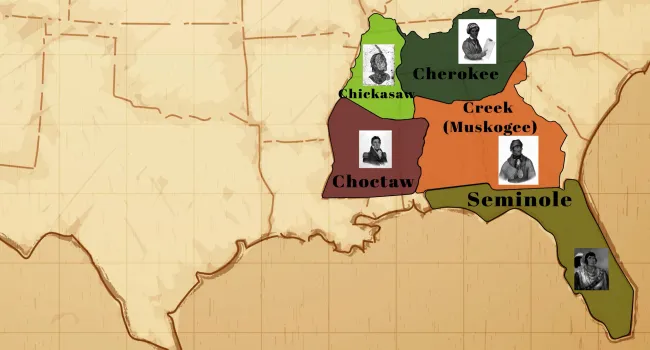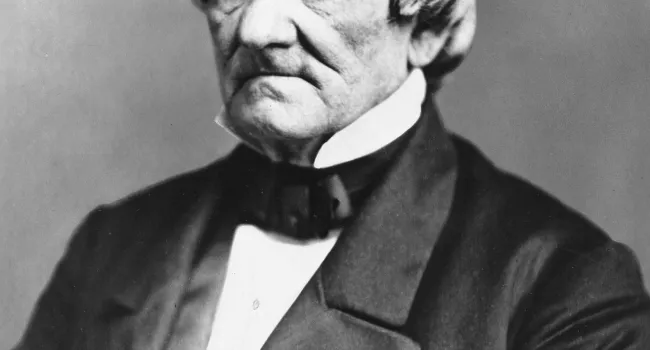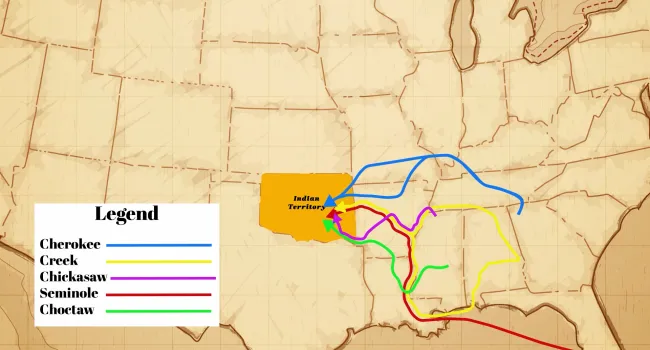This vocabulary list includes important historical figures and terms seen in this edition of History in a Nutshell:
Andrew Jackson: The seventh President of the United States. After Jackson's election in 1828, the removal of Native Americans from the eastern U.S. was the Jackson administration's first priority.
Assimilation: In the context of Native Americans in the early 1800's, the U.S. government's plan (known as "civilization) was to have Native Americans adapt the traditions and customs of White Americans. This was believed to be a necessary action for peaceful coexistence between Native Americans and Anglo-European settlers.
Civilization: "The civilization program promoted commercial agriculture, Christianity, an alteration in the gender-based divisions of labor among Indians, and, most importantly, private ownership of land. Americans hoped that if Indian peoples settled down to farm life, they would have little need of vast hunting territories and would willingly cede this “excess” territory to Americans. The government also encouraged Indians to run up debts to traders and government stores. Indian debts, which outstripped their ability to pay, could then be settled by sale of tribal lands." (Definition from National Park Service)
"Five Civilized Tribes": The name for the group of the most prominent Native American tribes which resided in the southeastern U.S. - the Cherokee, Chickasaw, Choctaw, Creek, and Seminole.
George Washington: The first President of the United States. Following the American Revolution, Washington, together with Secretary of War Henry Knox developed the policy of civilization for Native Americans.
Georgia Gold Rush: Gold was discovered within the Cherokee territory in Georgia in late 1828. Although it is unknown as to who exactly discovered this gold, many White settlers flocked to Georgia in 1829 with hopes of striking it rich. The discovery of gold was one of the main contributing reasons why settlers desired the removal of Native Americans from Georgia.
Georgia Land Lottery: In 1832, the state of Georgia divided up Cherokee owned land which contained gold. Georgians purchased $18 "draws" for a chance to win one of these lots, which was 160 acres of land each. There were 18,000 lots total, and approximately 85,000 Georgians purchased these draws. As lottery winners were announced, the Cherokee living in those lots were forced to vacate their homes.
Henry Knox: The first Secretary of War, under President George Washington. Knox collaborated with Pres. Washington to develop the American policy of "civilization".
Indian Removal Act of 1830: Signed into law by President Andrew Jackson on May 28, 1830, the bill authorized the president to grant lands west of the Mississippi in exchange for Indian lands within existing state borders. A few tribes went peacefully, but many resisted the policy of forced relocation.
John Marshall: Chief Justice of the U.S. Supreme Court who oversaw both Cherokee Nation v. Georgia and Worcester v. Georgia court cases. While the first case did not get a ruling, Marshall issued a ruling for Worcester v. Georgia in favor of the Cherokee Nation. Despite this ruling by the Supreme Court, it was not enforced by President Andrew Jackson and the state of Georgia.
John Ross: Principal Chief of the Cherokee Nation during the Indian Removal Act. Ross, together with William Wirt (former attorney general) challenged President Andrew Jackson's Indian Removal Bill in the courts. The two main lawsuits - Cherokee Nation v. Georgia, and Worcester v. Georgia made it to the Supreme Court, where the latter case was issued a ruling in favor of the Cherokee Nation.
Treaty of New Echota: U.S. government officials and about 500 Cherokee Indians claiming to represent their 16,000-member tribe, met at New Echota, Georgia, and signed a treaty on December 29, 1835. The agreement led to the forced removal of Cherokees from their southeastern homelands to Indian Territory west of the Mississippi River.
William Wirt: Former attorney general who assisted Cherokee Principal Chief John Ross in the lawsuits which challenged President Andrew Jackson's Indian Removal Bill - Cherokee Nation v. Georgia, and Worcester v. Georgia.






